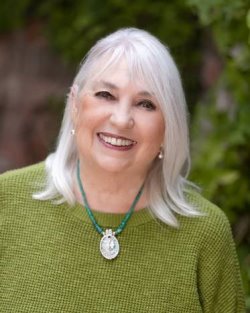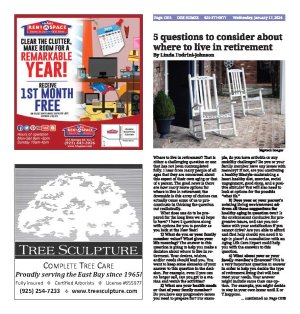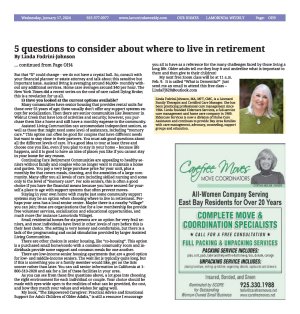|
|
Published January 17th, 2024
|
5 questions to consider about where to live in retirement
|
|
| By Linda Fodrini-Johnson |
 |
| Linda Fodrini-Johnson, MA, MFT, CMC, is a
Licensed Family Therapist and Certified Care Manager. She has been
practicing professional care management since 1984. Linda founded
Eldercare Services, a full-service care management and home care
company in 1989. Eldercare Services is now a division of Home Care
Assistance and continues to provide Bay Area families with care
management, advocacy, counseling, support groups and education. |
Where to live in retirement? That is either a challenging question or one that has not been contemplated fully. I hear from many people of all ages that they are concerned about this aspect of their own aging or that of a parent. The good news is there are now many more options for where to live in retirement; the downside is this array of choices can actually cause some of us to procrastinate in thinking the question out realistically.
 What does one do to be prepared for the long lives we all hope to have? I have 5 questions along with options for you to ponder as you look at the New Year!
What does one do to be prepared for the long lives we all hope to have? I have 5 questions along with options for you to ponder as you look at the New Year!
 1) What do you or your family member value? What gives your life meaning? The answer to this question is going to help you make a decision about where to live in retirement. Your desires, wishes, and/or needs should lead you. You want to keep some elements of your answer to this question in the decision. For example, even if you can no longer sail, can you get to a marina and watch the activities?
1) What do you or your family member value? What gives your life meaning? The answer to this question is going to help you make a decision about where to live in retirement. Your desires, wishes, and/or needs should lead you. You want to keep some elements of your answer to this question in the decision. For example, even if you can no longer sail, can you get to a marina and watch the activities?
 2) What are your health needs or that of your family member? Do you have any progressive issues you need to prepare for? For example, do you have arthritis or any mobility challenges? Do you or your family member have any issues with memory? If not, are you continuing a healthy lifestyle-maintaining a heart healthy diet, exercise, social engagement, good sleep, and a positive attitude? You will also need to look at options for the possible "what ifs."
2) What are your health needs or that of your family member? Do you have any progressive issues you need to prepare for? For example, do you have arthritis or any mobility challenges? Do you or your family member have any issues with memory? If not, are you continuing a healthy lifestyle-maintaining a heart healthy diet, exercise, social engagement, good sleep, and a positive attitude? You will also need to look at options for the possible "what ifs."
 3) Does your or your parent's existing living environment address all those suggestions for healthy aging in question two? Is the environment conducive for progressive issues, and can you continue with your socialization if you cannot drive? Are you able to afford and find help should you need it to age in place? A consultation with an Aging Life Care Expert could help you with the answers to this question.
3) Does your or your parent's existing living environment address all those suggestions for healthy aging in question two? Is the environment conducive for progressive issues, and can you continue with your socialization if you cannot drive? Are you able to afford and find help should you need it to age in place? A consultation with an Aging Life Care Expert could help you with the answers to this question.
 4) What about your or your family member's finances? This is a very important question to answer in order to help you decide the type of retirement living that will best meet your needs. Your answer might include more than one option. For example, you might decide to stay in your own home until X or Y happens. But that "X" could change - we do not have a crystal ball. So, consult with your financial planner or estate attorney and talk about this sensitive but important issue. Assisted living is averaging around $6,000+ monthly without any additional services. Home care averages around $40 per hour. The New York Times did a recent series on the cost of care called Dying Broke; this is a revelation for us all.
4) What about your or your family member's finances? This is a very important question to answer in order to help you decide the type of retirement living that will best meet your needs. Your answer might include more than one option. For example, you might decide to stay in your own home until X or Y happens. But that "X" could change - we do not have a crystal ball. So, consult with your financial planner or estate attorney and talk about this sensitive but important issue. Assisted living is averaging around $6,000+ monthly without any additional services. Home care averages around $40 per hour. The New York Times did a recent series on the cost of care called Dying Broke; this is a revelation for us all.
 5) Have you looked at the current options available?
5) Have you looked at the current options available?
 Many communities have senior housing that provides rental units for those over 55 years of age; these usually don't offer any support systems except for socialization. Then there are senior communities like Rossmoor in Walnut Creek that have lots of activities and security; however, you purchase them like a home and still have a monthly expense to the community.
Many communities have senior housing that provides rental units for those over 55 years of age; these usually don't offer any support systems except for socialization. Then there are senior communities like Rossmoor in Walnut Creek that have lots of activities and security; however, you purchase them like a home and still have a monthly expense to the community.
 Assisted Living Communities can accommodate independent seniors, as well as those that might need some level of assistance, including "memory care." This option can often be good for couples that have different needs but want to stay close to their partners. You must ask good questions about all the different levels of care. It's a good idea to tour at least three and choose one you like, even if you plan to stay in your home - because life happens, and it is good to have an idea of places you like if you cannot stay in your home for any reason.
Assisted Living Communities can accommodate independent seniors, as well as those that might need some level of assistance, including "memory care." This option can often be good for couples that have different needs but want to stay close to their partners. You must ask good questions about all the different levels of care. It's a good idea to tour at least three and choose one you like, even if you plan to stay in your home - because life happens, and it is good to have an idea of places you like if you cannot stay in your home for any reason.
 Continuing Care Retirement Communities are appealing to healthy seniors without family and couples who no longer want to maintain a home and garden. You pay a very large purchase price for your unit, plus a monthly fee that covers meals, cleaning, and the amenities of a large community. Many offer you all levels of care including skilled nursing and some only to the level of "memory care". For solo seniors, this is often a good choice if you have the financial means because you have secured for yourself a place to age with support systems that often prevent moves.
Continuing Care Retirement Communities are appealing to healthy seniors without family and couples who no longer want to maintain a home and garden. You pay a very large purchase price for your unit, plus a monthly fee that covers meals, cleaning, and the amenities of a large community. Many offer you all levels of care including skilled nursing and some only to the level of "memory care". For solo seniors, this is often a good choice if you have the financial means because you have secured for yourself a place to age with support systems that often prevent moves.
 Staying in your own home with maybe just some community support systems may be an option when choosing where to live in retirement. Perhaps your area has a local senior center. Maybe there is a nearby "village" you can join; these are organizations that for a low membership fee provide free volunteer services, socialization and educational opportunities, and much more (for instance Lamorinda Village).
Staying in your own home with maybe just some community support systems may be an option when choosing where to live in retirement. Perhaps your area has a local senior center. Maybe there is a nearby "village" you can join; these are organizations that for a low membership fee provide free volunteer services, socialization and educational opportunities, and much more (for instance Lamorinda Village).
 Small residential homes for six persons are an option for very frail seniors, and most individuals have lived in other levels of care before this is their best choice. The setting is very homey and comfortable, but there is a lack of the programming and social stimulation provided by larger Assisted Living Communities.
Small residential homes for six persons are an option for very frail seniors, and most individuals have lived in other levels of care before this is their best choice. The setting is very homey and comfortable, but there is a lack of the programming and social stimulation provided by larger Assisted Living Communities.
 There are other choices in senior housing, like "co-housing". This option is a purchased small home/condo with a common community room and individuals provide some support and common meals for one another.
There are other choices in senior housing, like "co-housing". This option is a purchased small home/condo with a common community room and individuals provide some support and common meals for one another.
 There are low-income senior housing apartments that are a good option for low- and middle-income seniors. The wait list is typically quite long, but if this is something you or a family member would like, get on the lists sooner rather than later. You can call senior information in California at 1-800-510-2020 and ask for a list of these facilities in your area.
There are low-income senior housing apartments that are a good option for low- and middle-income seniors. The wait list is typically quite long, but if this is something you or a family member would like, get on the lists sooner rather than later. You can call senior information in California at 1-800-510-2020 and ask for a list of these facilities in your area.
 As you can see from these five questions above, a lot goes into choosing the right environment for each individual or couple. Your choice should be made with eyes wide open to the realities of what can be provided, the cost, and how they match your values and wishes for aging well.
As you can see from these five questions above, a lot goes into choosing the right environment for each individual or couple. Your choice should be made with eyes wide open to the realities of what can be provided, the cost, and how they match your values and wishes for aging well.
 My book, "The Empowered Caregiver: Practical Advice and Emotional Support for Adult Children of Older Adults," is still a resource I encourage you all to have as a reference for the many challenges faced by those living a long life. Older adults tell me they buy it and underline what is important to them and then give to their children!
My book, "The Empowered Caregiver: Practical Advice and Emotional Support for Adult Children of Older Adults," is still a resource I encourage you all to have as a reference for the many challenges faced by those living a long life. Older adults tell me they buy it and underline what is important to them and then give to their children!
 My next free Zoom class will be at 11 a.m. Feb. 9. It is called "What is Dementia?" Just send me an email to attend this free class -
LindaFJ620@outlook.com
My next free Zoom class will be at 11 a.m. Feb. 9. It is called "What is Dementia?" Just send me an email to attend this free class -
LindaFJ620@outlook.com |
|
|
|
|
|
|
|
|
|
|
|
|
|



